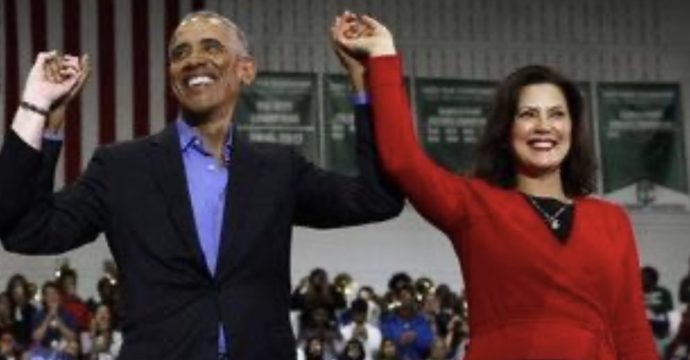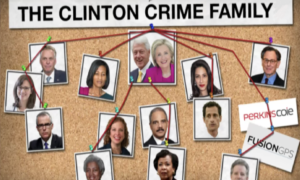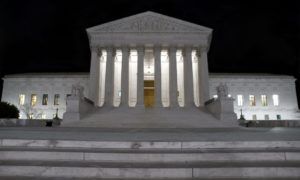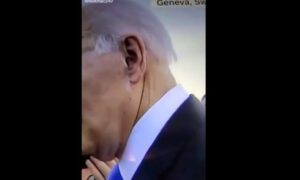As frenzied backers struggle to tamp down brushfires erupting around Konnech’s sharing of confidential election-worker information on foreign servers, new information is fueling a firestorm likely to devastate the Michigan-based company. Come to find out, the election software management firm is suspected of compromising the security of the nation’s Uniformed And Overseas Citizens Absentee Voting Act, UOCAVA. Federal, state, and university officials who helped Konnech worm its tentacles into U.S. overseas and domestic elections processes are scrambling to deflect the heat.

Eugene Yu, Konnech CEO, was arrested and taken into custody on October 4 for stealing US election worker data and storing it on Chinese servers. The arrest came as part of Los Angeles County District Attorney George Gascon’s investigation into Konnech’s possible theft of personal identifying information of election workers.

Documents show Konnech, Inc., founded in 1999 in East Lansing, Mich., received $306,000 grant funding from the Michigan Economic Development Council with Gov. Gretchen Whitmer’s blessing.

A quick web search shows that the Department of Defense awarded $247,349 to Konnech in 2010-2011. The grant’s stated purpose was to help the election software management company research, develop, and provide “online voting services using automated wizards” for absentee voting processes in Nevada, Montana, and New Jersey. Barack Obama was U.S. President from January 2009 through January 2017.

Source: USAspending.gov
In 1986, the federal government enacted the Uniformed And Overseas Citizens Absentee Voting Act in order to enable special registration and absentee voting provisions for military and overseas civilians. The Department of Defense administers the UOCAVA program.
According to the Konnech tool App, “the City of Detroit under a grant from the Department of Defense…allows any Uniformed and Overseas Citizen to register annually with the Federal Post Card Application (FPCA) form and request access to an absentee ballot, and to submit a Federal Write-in Absentee Ballot (FWAB) at the same time easily.”

After CEO Yu’s arrest, the city of Detroit, Michigan, and Fairfax County, Virginia, terminated their contracts with Konnech and discontinued the use of Pollchief, the software used to manage confidential poll worker information. Oddly, DeKalb County, Georgia, with the ink barely dry on its one-month-old contract, voted 3-2 to continue with Konnech on condition the company host the county’s poll worker data in Georgia.
Early warning signs—suspicious discrepancies.
***BEST NEWS HERE ON TELEGRAM!***
JOIN OUR CHANNEL
-https://t.me/BestNewsHereIn 2020 the FBI, Cybersecurity and Infrastructure Security Agency, Election Assistance Commission, and National Institute of Standards and Technology described the UOCAVA process as “high risk” and “susceptible to fraud.”
Catherine Engelbrecht and Gregg Phillips first broke the story that Konnech servers were located in Communist China in January 2021. Kanekoa The Great, an investigative journalist and blogger, reported on the findings of The Pit on Sept. 8, 2022.

Save on MyPillow products. Use promo code FEDUP at checkout and save 50% on all MyPillow Down Comforters.
On Oct. 3, the day before Yu’s arrest, the New York Times published an article labeling the researchers as conspiracy theorists, baselessly picking on a small company. How a Tiny Elections Company Became a Conspiracy Theory Target. The Times later printed a correction.

Then something peculiar happened.
Despite citizens flocking home to America’s shores in 2020 due to fears of COVID-19, non-military UOCAVA voters skyrocketed as high as 573,000 from 2016 numbers of around 228,000. Meanwhile, overseas military voters dropped to 37% of total UOCAVA voters.

Source: VerityVote.us
A significant discrepancy in the number of non-military UOCAVA voters exists between government agency reports to Congress. In 2020, the DOD reported 224,139 non-military UOCAVA voters; the Election Assistance Commission reported 573,000. The 349,000 difference compounds when a person considers that UOCAVA voters may select ANY address to serve as their domicile residence of record, even if they never lived at that address.

Source: Verityvote.us
Per the Federal Voting Assistance Program, FVAP, an overseas non-military voter may claim an address of domicile “even if you have not physically been present at that address.”
Plus, questions exist as to whether citizenship is even verified. Social security number? Voter ID? Not required. “
Meanwhile, Michigan’s GOP-controlled legislature rushed two bills through its senate and house, authorizing military voters to cast ballots electronically.
Is anyone so naïve as to believe that, when the law goes into effect in 2024, courts won’t be slammed with lawsuits demanding non-military voters also qualify under federal UOCAVA laws?
In a signal of what is to come, Mich. Gov. Gretchen Whitmer (D) is reportedly waiting, pen in hand, eager to sign the bills into law, despite her vetoing hundreds of other bipartisan bills.

“I’m beginning to see a pattern here,” a chairperson of one of Pure Integrity Michigan Elections’ committees said and asked to remain anonymous. Given the massive shift in public opinion going into the November elections, the committee chair wondered if “the left is trying to remove their opposition from the voting process completely through fear and intimidation. Usual tactics are deployed in a different ways. I would hate to think that people would be discouraged about participating though when so many willingly hand their personal data to foreign adversaries through Tik Tok.”


























